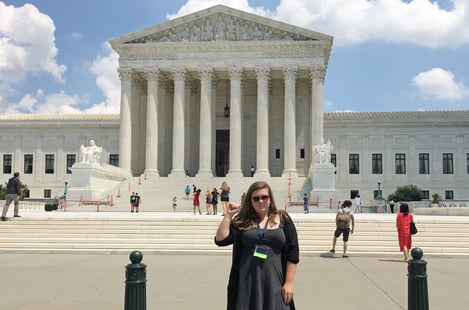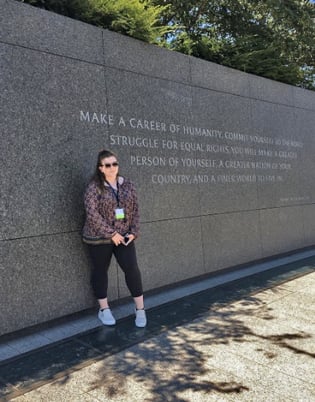
This summer, I attended the American Civil Liberties Union (ACLU) Summer Institute for high school upperclassmen in Washington D.C. The ACLU is a national, nonpartisan organization that works in legislatures, courts, and communities to protect the civil liberties and rights of all Americans. My interest in the organization piqued during the 2016 election, as the ACLU played a vital role in informing the public about both Hillary Clinton’s and Donald Trump’s strengths and weaknesses as presidential candidates as well as exposing what the legal effects on each candidate's proposals might entail for the American people.
As a politically active person, I’ve always been outspoken in my beliefs and ideas about current events and social justice issues. This meant that, before the institute, I generally thought of myself as an activist. The last year at school was filled with political discourse, which was a feeding frenzy for my activist brain. Occasionally, my strong opinions got in the way of valuable conversations with my classmates about opposing viewpoints and the political climate. I knew I wanted to do something during summer 2017 to expand my views on political issues. When my English teacher, Mrs. Reimold, informed me about the ACLU Summer Institute, I began my application essay instantly.
Accepted into the Institute, I received LGBTQ+ Rights for my elective course. Upon my arrival, I met other high schoolers who told inspiring stories and who were open about their experiences as activists and who wanted to discuss issues of social justice and political importance. This made my elective course all the more interesting, as I heard from other LGBTQ+ teens about their experiences as part of the community, and I felt open to share mine. From this, it was easy to ignite even more passion inside of us to learn how to fight for our rights as LGBTQ+ youth and to share further our experiences with others.
 In addition to my elective course, the week consisted of great activities, including speakers to listen to and shows to watch. We heard Faiz Shakir, the ACLU National Political Director, talk about empowering youth and “rising up” in our communities. Anthony Romero, the ACLU Executive Director, discussed his experience with the ACLU and suggested ways to be more politically active in our community. The ACLU Deputy Legal Director, Jeff Robinson, talked to the group about the history of racism and the criminal justice system, which we followed up with a very moving trip to the National Museum of African American History and Culture. Edward Snowden Skyped us from Russia to talk about Net Neutrality. Then for fun, we saw a hilarious political satire routine performed in the Kennedy Center. These are only a fraction of events that we attended, and, from each one, I became more aware of different viewpoints and issues.
In addition to my elective course, the week consisted of great activities, including speakers to listen to and shows to watch. We heard Faiz Shakir, the ACLU National Political Director, talk about empowering youth and “rising up” in our communities. Anthony Romero, the ACLU Executive Director, discussed his experience with the ACLU and suggested ways to be more politically active in our community. The ACLU Deputy Legal Director, Jeff Robinson, talked to the group about the history of racism and the criminal justice system, which we followed up with a very moving trip to the National Museum of African American History and Culture. Edward Snowden Skyped us from Russia to talk about Net Neutrality. Then for fun, we saw a hilarious political satire routine performed in the Kennedy Center. These are only a fraction of events that we attended, and, from each one, I became more aware of different viewpoints and issues.
Although I took away lots of knowledge about social issues and activism from the Institute, the biggest lesson I learned was in listening and discussing with peers, even if it’s about difficult topics. In my opinion, the reason that the election year was so volatile was because most people did not sit and talk with each other. Miscommunication and societal disconnect caused widespread outrage experienced in homes, schools, and communities all around the country. My goal for the next school year is to encourage civil conversation about difficult political topics, thereby cultivating new understanding and empathy for all opinions in the student body at Tabor. In the end, we all have something valuable to say. But what’s even more valuable than an opinion is a willingness to sit down, listen, and engage.
I recommend applying to the ACLU Summer Advocacy Institute to all sophomores and juniors. It was a transformative experience for me, and I believe it was extremely valuable to my new understanding of social justice, current events, and political issues.








